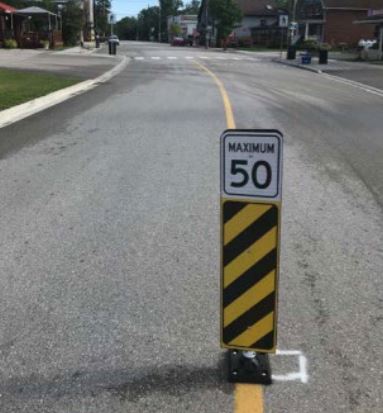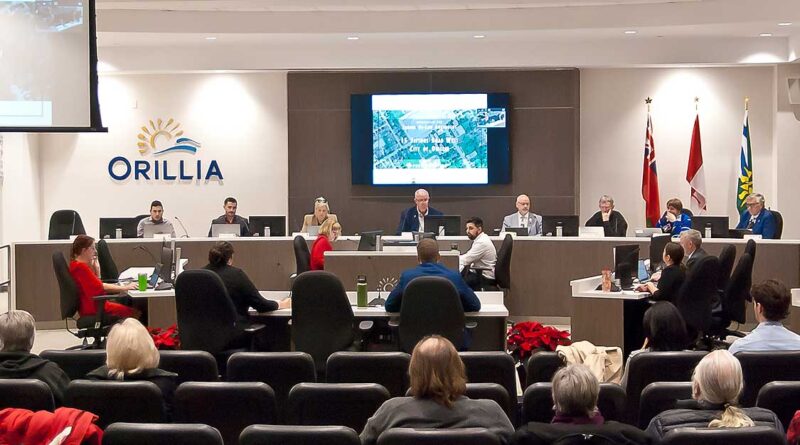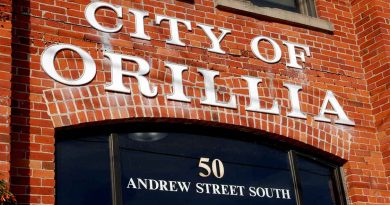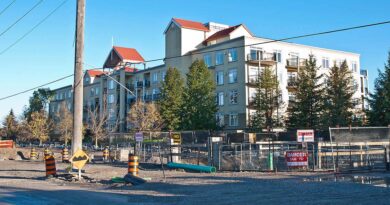Council Preview
By John Swartz
Orillia council has a meeting Monday, September 8 at 2 p.m., which gets off to a roaring stop as far as the public is concerned once meeting opening formalities are done. There are no deputations or presentations, so they will go right into a closed session after the public forum happens.
The closed session has 4 items on the list. The amount of cursory detail relating to what the items of discussion are about is getting skimpier. They have an item regarding a settlement offer. Settlement of what? Heavy matter from the fresh water intake at the water treatment plant? Settlement of dust on furniture in the corner office? It’s becoming increasingly difficult to stay on top of what kind of business is taking place behind closed doors when such vague descriptions are offered.
Another is about land acquisition, probably somewhere within City limits; an option to purchase land in the Horne Business Park (this is about 100% more descriptive than the previous two items), and a request to waive development rights in the Horne Business Park – what rights? To whom?
Of the latter it strikes this writer that it relates to land in which ownership has already passed from the City to someone else, so why isn’t that detail included? It’s conceivable whatever is being proposed might become problematic for everyone else if they want development rights waived; we won’t know until it’s a done deal, and even then, when closed session items hit the public agenda there are often only cursory details offered, so we may not know what was given away until a company sign goes on a building. This is not good enough.
Back In Public
Council has 10 reports on the agenda. The first is from Mayor
Don McIsaac about making public transit more affordable. The perception of what public transit is by municipal officials, elected or otherwise, is illustrated by the language used. Fares are called sales, the difference between revenue of $1.78 million and the $3.63 million cost is called a net loss instead of investment.

Sure, on paper contributing $1.8 million to the operation of the system could be viewed as a loss, but to those who use the system, or benefit (local businesses) from someone using the system it’s not really a loss. It’s not a business, it’s a service taxpayers have agreed, mostly, to have.
The revenue breaks down to -$825K from fares, $286K from Lakehead University student fares, and gas tax funding of $596K.
The fares were compared to 6 other communities, which are not listed, and Orillia’s fares are an average of 10 cents higher for one ride, 50 cents lower for a senior’s fare, and the monthly pass was recently bought into line with the average.
The mayor is proposing a substantial fare reduction for a 15 month period beginning New Year’s Day 2026. Regular fares would go down from $3.10 to $2. A new 7 day pass would be available for $10 and the monthly pass would be cut from $68 to $30.
This is significantly encouraging. Several cities (Luxembourg City, Tallinn, Estonia; Canmore, Orangeville, Mont-Tremblant, Albuquerque, Alexandria and Richmond in Virginia, and Kansas City) are recognizing public transit is important to economic health of all concerned and have eliminated fares; some cities have no fares for certain areas (Boston has free service on routes from low income areas) and many others are investigating the idea.
A $1 fare was discussed back in 2008 during the planning stage for the revamp of Orillia’s system.
Within one year of starting the revised service in 2009 ridership for Orillia Transit doubled. That was just with harmonizing the split half hour routes (8 routes essentially) into 4, moving the terminus of routes to West Street, and extending operating hours (which were again extended a few years later).
Staff have recommend fare increases almost annually. It is a known factor fare increases reduce ridership. Making Orillia’s service easier to understand, more timely and of longer duration operationally was enough to boost ridership, lowering the fare by 50 cents back then might well have blown the roof of increased ridership.
The mayor states in the report the hope is to increase ridership. Casino Rama has a betting line on that.
There have been complaints about the service, there always will be, but compared to the service Orillia used to have, the one we now have is fantastic. The goal was to reduce the time on a bus from as long as 45 minutes (get on the bus where you live, get off at work or where you shop), down to 20 minutes. That was largely achieved. Another goal was to eliminate the guess work if a bus was even coming when it was needed due to the split run of old, to riders knowing there would be a bus at their stop every half hour. The constant fare increases have taken the shine of what is arguably a good system for a city of our size.
Lowering fares isn’t just about helping low income riders. Too many people who think operating their cars every day to make the same trip to work and back home is cheaper don’t take into account all the expense of cars beyond the price of gas. Plus it’s hard to ignore the convenience of having a car at hand. In big cities few think about taking their cars to work, but in places like Orillia they think nothing of it. And with the automatic speed traps in use now, and more contemplated, the trip to work may be even cheaper on the bus.
The mayor is proposing $444K be transferred from the province’s Transitional Mitigation Payment to cover the reduced fares. This source of funds is not ongoing.
One thing is certain, if governments want to get serious about climate change mitigation, investment in public transit is necessary. Orillia may only have 33,000 people, but our recognized catchment are is more than 100,000. One only has to be observant of the high volume of traffic coming into the city on Coldwater Road any time of day to understand the magnetic power of Orillia. On Tuesday last week, a trip out to Ramara was an eye-opener, observing the steady, packed stream of two-lane traffic on Front Street and the entire length of Atherley Road of traffic coming into the city – at 10 a.m.
It might be wise to start now to plan park and rides say on Coldwater near the boundary line (where ever that ends up) and on Atherley at the Narrows, with corresponding, efficient transit connections taking commuters into the city.
At the same time, it is worth noting the premier of Ontario has talked about changing (reducing) the Dedicated Gas Tax funding to communities (the money for the 413 has to come from somewhere). This would be disastrous and people should be communicating to their MPPs not to touch this funding, unless it’s to find ways to increase the funding.
Stop, Maybe
Councillors Jay Fallis and Jeff Czetwerzuk are back trying to have something done with neighbourhood concerns with traffic at Orion Boulevard and Monarch Drive. They lost an effort to get all way stops installed because the criteria was not met in two of the three indicators. They argue the two failing points were close and with more homes being built in the area a new study sometime next year might show different results.

They would like to have knock down posts installed at the intersection. These would serve as a wake up to drivers approaching the intersection. They also want staff to do another study next fall with an eye toward an all way stop or a traffic circle being installed.
This raises a question about planning. The amount of homes proposed for the West Ridge is not a secret, neither is the network of roads, how is it that no one thought to design, or insist to design the road layout using traffic circles from the start? Traffic circles are harder and more expensive to make after the fact. Isn’t that the point of planning?
Window Shopping For Food
The food access and sustainability working group has a report asking council to declare to the province a household food insecurity emergency exists in Orillia
This is largely public awareness effort, but there are some concrete requests the group is making of council to adopt. They are:
- Support the development and implementation of the Orillia poverty reduction strategy and the Orillia and Area community food strategy
- Promote living wage employment in Orillia
- Provide ongoing support for local initiatives such as Information Orillia’s low-cost income tax clinic
- Advocate to the provincial and federal governments for income-based policy solutions, including:
- Increased social assistance rates
- A guaranteed livable basic income
- Investments in affordable housing and mental health services
These are important, but maybe more important is demanding the major grocery conglomerates to not be greedy price gougers. One has been caught labelling price indicators on shelves to show Canadian product that was in fact produced elsewhere, and also putting higher weights on meat packages than was actually in the package.
I don’t remember the cow strike of 2023, do you? The reports say the price of coffee has increased by 50%, but real cash register receipts say it’s 100%. With coffee this raises another issue, the corporatization of food production from farm to processing factory. A coffee importer outlined what has happened; aside from lower production because of climate change, he says that’s not enough to justify the increase. He puts the blame squarely on hedge funds which recently discovered coffee futures. Like the distortion in the housing market caused by ‘investors’ he claims hedge funds have driven the price abnormally up.
The points offered by the working group should be made into practice, but we should also be demanding the stranglehold corporations have on us be broken up. Maybe the City of Orillia could lead the charge.
For the Birds
In June the City created the bird friendly city working group and they already have a report to consider. The group wants staff to submit an application to Nature Canada by September 22 to be designated a Bird Friendly City. There are many requirements to meet in order to get the designation.
The group has already completed the 54 page application, and they also want staff to pick 5 of the most feasible of 20 recommendations they found and report back to council next year. Several of the objectives can be accomplished by making space on the City’s website for education/information/resources to promote elimination of hazards to birds, or make environments for birds. Others relate to practices to be adopted by the city like erecting birdhouses, or putting up signs not to feed the wildlife (geese).
One of the big recommendations to council is to control wild cats. The City wrestled with this a dozen years ago, and we still have a problem.
Don’t Get Too Far Ahead
Staff have a report responding to a council request to ‘pre-zone’ a property at 63 Bond Street for additional development. They meant rezone. City staff a fixation with using the prefix ‘pre’ which is entirely unnecessary in almost every application it is used. The prefix ‘pre’ means before, not to indicate an act being committed, such as registering to participate in an activity (pre-register), or rezoning a property. A phrase from Ingo Montoya comes to mind.
The issue is the property owner, Redwood Park Communities, already has a fourplex on the property, with apparently enough room to also accommodate a five unit residence. They want to get the approval now, rather than when they are ready to build.
Staff say, this is not a good idea. The usual process is to look at proposals and site plans to see if they will work on a case by case basis. Rezoning now bypasses some of the development process. Staff say it also presents a precedent other developers could hold over the City. Bureaucratic staff are loath to do anything that can remotely be perceived as a precedent, even for unique cases that could not conceivably arise in the future. In this case staff are correct and the main option for council is to receive the report, which means do nothing.
Valves? Check.
Staff want council to approve a budget for repairs that were not in the 2025 budget for the waste water system. A lightening strike on the City’s secondary digester during the ice storm caused a lot of damage. Most of the cost to repair is insured, but inspection of the entire component revealed gas check valves were not operating as they should and need to be replaced.
The City also installed a splash pad at Tudhope Park and are finding out now the system to remove waste water is not up to snuff for the increased load and several check valves need to be replaced. At the same time a similar situation was observed at the Forest Avenue pumping station and a couple of valves were marked for replacement. In the case of these two situations, waste water is being recirculated that should be moved on downstream.
The cost of the work is $125K.
It’s Over
Staff have a report to council informing them of the completion of 77 capital projects. Most of those involve funding from various reserves. Past practice was to inform accounting to close the books on each project and overruns would be dealt with internally since most projects come in under budget and are added back to reserve budgets – offsetting the over runs.
This was changed to inform council publicly of project overruns. In this case there was $909K of overruns for 11 projects, but overall $7.5 million was unspent.
No Tax Shift For You
The province created a new property tax class called the multi-residential affordable rental housing subclass, which comes with an up to 35% discount on property taxes related to the rates charged for other multi-residential units.
The city currently has two classes, multi-residential and new multi-residential, to which the affordable classes would be subbed.
Staff say, at the end of the exercise, the same total amount of property tax charged and collected has to be the same, so any discount would have to be picked up by other classes. They also say residential property taxpayers would bear the brunt with up to an estimated $1.7 million in higher taxes for homeowners. Staff are not recommending making this move.
More Work
Typical of provincial cost saving moves, the ability given to mayors under the strong mayor legislation regarding budgeting is adding a layer of paper work for councillors, which comes with the time to lay out an argument to make amendments to the mayor’s proposed budget.
In the past, if a line item was challenged, or council thought differently than staff on an expenditure, they would discuss it at the budget meeting, make an amendment on the spot to the item and move on. Sometimes it was simply consensus they didn’t want to spend the money on an item. Now they have a form (three different ones) to fill out, with justification, to make any changes. Councillors will now have to
• Ensure alignment with legislated service level requirements;
• Evaluate financial implications of proposed changes
• Support alignment with Council’s priorities and/or identified community needs
• Clearly identify the affected service area and nature of the proposed change
• Define measurable impacts using relevant metrics (e.g. service volume, response time, number of users affected)
• Confirm the feasibility of the amendment within existing budget, staffing, and timeline constraints
• Establish a clear timeline for implementation, including expected outcomes, milestones, or review periods where applicable.
That’s a lot of research and extra work to do in advance for things that used to take minutes.
It remains to be seen how this will play out and what kind of discussion will accompany any such changes, which may or may not be coming to councillors with notice of the change. But we will find out later this month when the first round of budget deliberations happens.
Motions
There are three notice of motions from the last council meeting on the agenda. Councillor Whitney Smith wants to have a vote to reconsider a motion regarding boundary expansion passed in February in order to then change the motion to limit the amount of land required to 290 gross developable hectares.
Councillors Fallis and Czetwerzuk have two motions. One is to reconsider a motion from November 2024 regarding Atlantis Drive parking restrictions, and then to change the first motion to direct staff to do a parking study and report back, and in the meantime no parking restrictions be implemented on a provisional basis.
Their second motion is to revisit a motion from June regarding no parking on Atlantis Drive to narrowly define the no parking zone to 104 to 114 Atlantis Drive.
There are four enquiry motions. Councillor Tim Lauer has two. The first is to report back on the “feasibility of implementing a provision of a no-charge monthly transit pass for all to Ontario Disability Support Program recipients.”
The other is for staff to report on the “feasibility and logistics of maximizing tree planting opportunities in the planning and evaluation of all future road projects.”
Mayor McIsaac has one to have staff report back by December 8 on the automatic speed radar program and to evaluate implementation of additional traffic calming measures such as red-light cameras.
Councillor Fallis also has one about the speed radars. He wants staff to report on:
- The feasibility of installing permanent digital speed feedback signs immediately before all automated speed cameras in both directions.
- Options to improve the clarity of ticket communications, specifically by indicating that residents may contest tickets in person at City Hall using a form, as an alternative to the online portal.
- The potential for implementing a slightly higher speed buffer for vehicles travelling uphill or downhill within designated enforcement zones.
- The feasibility of introducing a ten-day grace period between the issuance of a first and second ticket to the same vehicle for infractions under 21 kilometres per hour over the posted speed limit, noting that this grace period would not apply to violations exceeding 21 kilometres per hour.
Tucked away in the by-laws section is one to ban the use of charcoal BBQs in City parks.
Council meetings are open to the public or can be watched on the City’s Youtube channel.
(Photos by Swartz – SUNonline/Orillia; Image Supplied)




